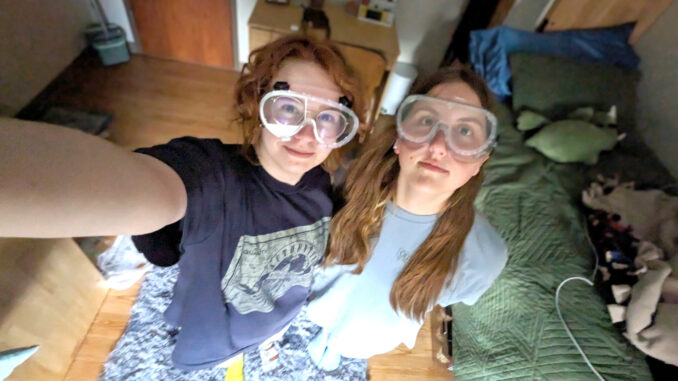
Paige Parsons | Staff Writer
For many of us, television has always been something to fall back on. Rough school days could be followed up with a good hour or so planted in front of a screen. Albeit probably not the most healthy stress relief tactic, sitting down to enjoy shows has been a constant within mine and others’ lives for many years.
My roommate and I regularly spend an hour or two watching shows as a way of bonding and spending time together amid our busy schedules. We are both STEM majors, so finding time for unstructured activities such as relaxation often takes a backseat to assignments and studying. There have been entire days where we haven’t seen one another due to our conflicting study schedules. At least we have one thing tying us together – our shared love of watching shows that do not require much thought to understand.
As university students, taking time to do something that goes against the standards of grind culture is so important for our mental health and preventing burnout.
Selfcare articles typically preach something along the lines of skin care or meditation, but so-called “terrible TV” works well for my roommate and me.
Fall of ‘23 marked our first semester at Duquesne and with it came all the anticipated stress of adapting to a college environment.
It was around this time that my roommate mentioned her quest to complete “Grey’s Anatomy” before the end of our freshman year. It quickly became a ritual for one of us to text the other after a particularly draining class or lab, asking to project the medical drama later that night.
Consuming the dialogue and conflicting storylines proved to be a great way for our minds to take a much needed break. Recently, “Riverdale” has taken over our nightly gatherings. Over the years, “Grey’s Anatomy” has garnered a begrudging respect among viewers; however, “Riverdale” is nearly impossible to defend. The poor quality of the writing and overdramatic, low-tier acting combine into a monstrosity that one cannot tear their eyes away from. Despite everything, I still find myself excited to watch the next episode.
For those who do not know, “Grey’s Anatomy” is a raunchy medical drama following the life of Meredith Grey, including her friends and love interests. While there may be some truth to the surgeries and medical terminology used in the show, everything is dramatized and a warped caricature of real life.
“Riverdale” is a modernized adaptation of the Archie Comics and a bad one at that.
The plot started out strong with a murder mystery surrounding the death of Jason Blossom, resident football captain and heir to his family’s fortune, but quickly transformed into a wild cash grab as the show continued for a total of seven seasons.
Perhaps it is not the show itself, but rather a combination of nostalgia and the company it is viewed with. Shows like “Riverdale” and “Grey’s Anatomy” were very popular as current university students were growing up, so nostalgia may play a role in the urge to revisit the shows.
It can also act as a bonding agent for those in similar age groups for exactly that reason.
Another classic from my childhood is “Teen Wolf.” I have a friend that practically qualifies as a film critic, what with their extensive repertoire of movies and ability to analyze any one of them on the spot – still, their favorite show remains “Teen Wolf.”
The YA drama is about a teenage boy overcoming his typical high school struggles such as girls and homework while also dealing with the ordeal of becoming a werewolf and having to hide it from everyone, including the supernatural hunter family of the girl he likes.
While deeper themes could undoubtedly be pulled from the slightly aged dialogue and interactions between characters, at face level it is cheesy and that’s what makes it so appealing to watch during the school year.
Watching shows that are easy to make fun of is one of the best ways to bond with those around you. There is a special kind of laughter that comes from witty jokes at the expense of poorly written characters and underdeveloped storylines.
Oftentimes we will find ourselves poking fun at how we once found no flaws within the show, and still viewing it with a sense of fondness despite those obvious flaws.
Terrible television has a certain charm to it that intellectual shows and documentaries lack.
Americans of all ages deal with work, whether it’s a chem lab or a 9-to-5, so shows that lack depth offer asylum for our overworked brains. Watching TV like this is not a bad thing, nor something to be ashamed of.
While they are by no means literary masterpieces in the classical sense, shows such as “Grey’s Anatomy,” “Riverdale” and “Teen Wolf” have a very special place in my life and the lives of many others. In the worst-best way possible.

